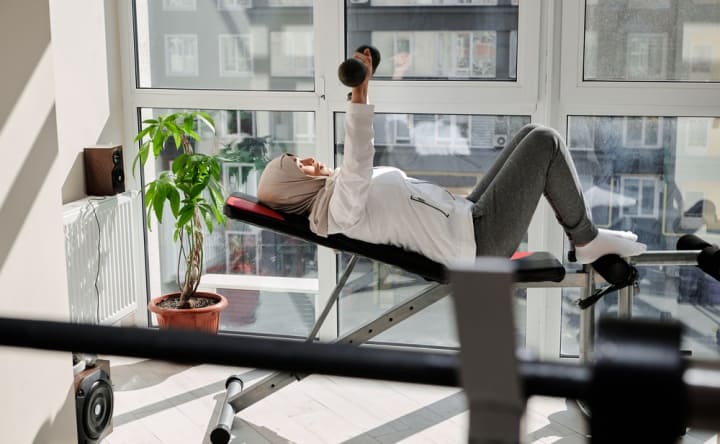Is Bodybuilding Haram or Halal? (what islam law says)
Max Health Living is a reader-supported site. Purchases made through links may earn a commission. Learn more.
Social media and modern physical culture are dangerous places for the spiritual well-being of young Muslims.
Bodybuilding culture even more so, which has raised the question: is bodybuilding haram?
There’s a big debate going on about whether or not bodybuilding is haram. Some people say that it’s fine to do as long as you’re doing it for health reasons, while others say that any form of bodybuilding is forbidden because it’s vain and self-centered.
So what’s the truth?
Bodybuilding is a popular approach to health and fitness that has only gained more popularity with the development of social media.
Today we’re discussing what that means for young Muslims and their relationship with fitness, the body, and the relationship between physical and spiritual well-being.
Disclaimer: Talk To An Expert
The internet is not the best source for more important questions of faith.
If you find that you are stuck in the nuances of any issue, you should seek your local faith leader and discuss the exegeses surrounding the topic.
The question of what haram is more important than a google search for the devout. Personal details can be lost in larger discussions like this, where the main questions are discussed without personal considerations.
While we can discuss the broad strokes of an issue, consulting with a Mullah is almost always the best choice for a question in matters of faith.
Fortunately, the question of whether bodybuilding is haram is a black and white issue with no nuance.
Is bodybuilding haram?
Yes – bodybuilding is haram. This is mainly because of bodybuilding competitions, which are unavoidably haram because of exposure to the awrah.
Training to develop the body is not de facto haram, but it also provides considerations – like pride and your relationship to aesthetic affirmations – that could be a problem.
Intent and process matter in training, while the nature of competition is a problem for Muslims.
There are two counts on which bodybuilding is likely to be haram. First, it is a pursuit closely associated with problems of pride and worldly aggrandizement. Secondly, it is the exposure of the body – particularly the awrah – to others during a bodybuilding competition.
1: Training and Pride
Like other Abrahamic religions, Islam rejects worldly vanity and self-absorption. Bodybuilding often falls foul of these haram patterns of behavior for focusing on the vain tendencies associated with this pageantry style and exposure. However, perceptions in this regard differ.
There is an argument by some that it is possible to use the struggle of strength training as a route to better developing the virtues of patience, tenacity, and self-abnegation, which are often laudable.
It can be the pursuit of excellence through struggle, a microcosm of the greater personal spiritual project of greater jihad.
It is impossible to say for certain if the training of bodybuilding is haram for this reason.
It can be one of many routes to transforming the inner self and building discipline.
It is obvious, however, that this is not the greatest form of abnegation of al-nafs al-amaranth (the lower self that seeks vice and carnal gratifications). In this way, it is important to consider how you approach training – there is a lot of variability between individuals.
2: Exposure to the awrah
Bodybuilding competition is clearly and directly haram. It is not only the seeking of worldly validation but the exposure of the awrah to judges, which is haram.
While the training of the body for strength, virtue, and well-being is lauded in Islam, the body’s exposure is directly stated to be haram. Bodybuilding competition requires a man to pose in skimpy underwear, clearly exposing the area from the navel to the knee.
This is haram for both the bodybuilder and (in the eyes of his faith) those who see him.
Bodybuilding is haram for its exposure of the self and the conspiracy in which it takes the observer. It is haram to expose and induce others to haram behavior, thus clearly not permissible under the tenets of Islam.
Of course, these restrictions are even more of a problem for women, where bodybuilding competition exposes more haram areas of the body than men. Women’s bodybuilding is not permissible in Islam.
Bodybuilding and Islam FAQ
Is exercise haram in Islam?
No, exercise is not haram. It is important to build a healthy, strong, and resilient body.
Muslim scripture often discusses the importance of physical well-being-exercise and preparation as both a worthwhile goal and a way of building character and its virtues.
Examples exist in the Hadiths and elsewhere discussing the importance of strength. This can be for health, to prevent capacity deterioration while aging, or to prepare for worthwhile physical activity.

The development of discipline, persistence, self-control and associated changes from exercise are important for a person’s internal and spiritual development. These are even more important in sports and other forms of social development in the community.
Is it healthy to be a bodybuilder?
Natural bodybuilding is a healthy pursuit – where there is no use of steroids.
Bodybuilding training is simple strength training and confers all the health benefits of improved metabolism, joint health, and regulation of hormones (and thus both mental and physical health).
Bodybuilding competition is typically unhealthy and involves a short-term loss of fat and water weight. These dip into the unhealthy range for most competitors, especially those with significant dehydration routines and short-term weight loss protocols.
Using steroids in “open” bodybuilding “is “also entirely unhealthy and should always be discouraged.
These are associated with a very high risk of side effects and damage to the heart, liver, and hormonal system.
Are steroids haram?
Steroids are haram because they cause harm to the body, which is explicitly forbidden. Because steroids are never safe for recreational use (with a very high prevalence of side effects), they are not safe and do not count as ‘useful’ for ‘non-medical’ purposes.

The use of steroids for sport is also bad as it constitutes undeniable cheating, a form of deceit, and flawed character that are unquestionably haram.
This produces the double vice of harming the body for fraudulent purposes.
Conclusion: Bodybuilding and Islam
Bodybuilding doesn’t have the correct focus for most Muslims.
It is often prideful, and the competitions are undoubtedly haram. The problem is the focus on prideful change, the focus on the world where it comes at the expense of the spiritual, and the way that competitions expose the body for vain reasons.
In a greater sense, the imbalance of life that comes with bodybuilding – a place of prideful extremes rather than well-being- and strength – makes it difficult for Muslims to reconcile with faith.
Other forms of sport and training are, however, far more appropriate.
Strength training is a great form of exercise, and developing a strong and healthy body is good for itself. The character virtues of self-abnegation (especially in diet and exercise) are excellent at a personal level.
Sport and exercise can also foster other important virtues.
They can be a way to foster social ties in a way that is healthy for the body. They can be used as a way to develop healthful practices and support the development of good character. It can also be a way to unite disparate urban communities, for example.
Sport is good – and strength training specifically – but bodybuilding is haram and lacks the laudable virtues of other forms of exercise.
Without competitions, bodybuilding, and training, the body is not haram if it is without prideful vanity.
Important Disclaimer: The information contained on MAX HEALTH LIVING is intended for informational and educational purposes only. Any statements made on this website have not been evaluated by the FDA and any information or products discussed are not intended to diagnose, cure, treat, or prevent any disease or illness. Please consult a healthcare practitioner before making changes to your diet or taking supplements that may interfere with medications.
Who We Are

We are a team of fitness, health, and supplement experts, and content creators. Over the past 4 years, we have spent over 123,000 hours researching food supplements, meal shakes, weight loss, and healthy living. Our aim is to educate people about their effects, benefits, and how to achieve a maximum healthy lifestyle. Read more.



